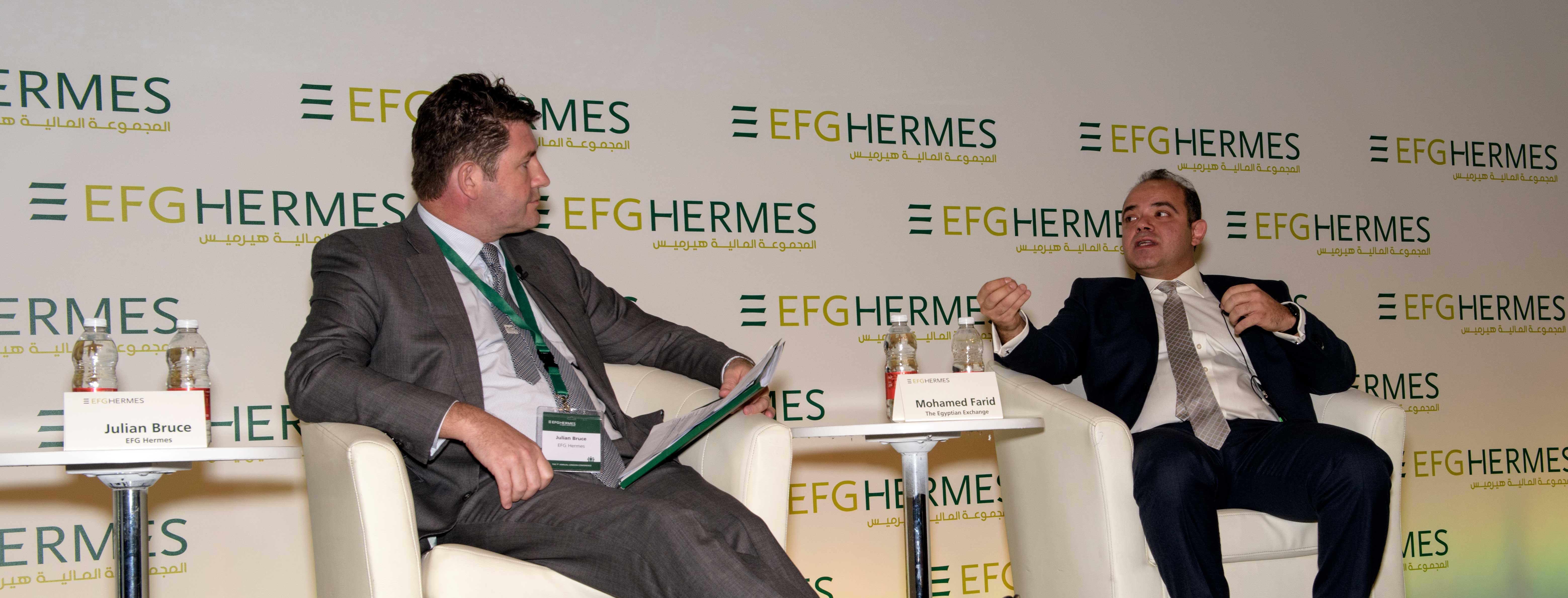 November 12, 2017
November 12, 2017
EFG Hermes Annual London Conference: EGX Chairman sets out stall for attracting investment to Egypt
EFG Hermes Annual London Conference: EGX Chairman sets out stall for attracting investment to Egypt
- Mohamed Farid plans to attract global investment by showcasing the nation’s distinct opportunities
- The Chairman of the Egyptian Exchange sets out measures to improve the size, liquidity and diversification of the market
- Farid has overseen a threefold increase in trading volumes, thanks to macroeconomic & investment reforms coupled with an increased demand for materializing IPOs and capital market reforms
London, 8th November 2017 – Mohamed Farid, the newly appointed Chairman of the Egyptian Exchange (EGX) and The Federation of Euro-Asian Stock Exchanges (FEAS), has this week outlined plans to attract investments to Egyptian markets over the coming years. Speaking in London, at the seventh annual conference run by the leading financial services corporation in the MENA region, EFG Hermes, Farid sounded a positive note regarding increasing liquidity and foreign investment in the market.
Pointing to signs of recovery in Egypt, with the country demonstrating a growth in real terms of 4% last fiscal year, Farid outlined the importance of Egypt’s diversified economy with various sectors contributing to economic growth and stability. Speaking with EFG Hermes’ head of brokerage of UAE, Julian Bruce, Farid discussed the steps being taken to improve the attractiveness of capital markets, stating:
“There are efforts to improve the investability aspect through improving the size and liquidity of sectors. The improved economic conditions tempt both investors and businesses to come to EGX from both domestic and international markets. This will only happen if we are optimistic in driving this, recognising that size of the market is vital in creating this liquidity and attracting both domestic and foreign investment.”
In an earlier presentation to attendees at the conference, Farid highlighted drop in unemployment in Q4 of 2016/17 to reach 11.98%, spurred on by rebounding tourism, telecommunications and construction sectors. Having seen political events impact the tourism industry in the previous year, there was particular cause for optimism around the 63.8% yearly rise demonstrated by the sector in Q3.
Regarding what is being done to tackle issues around increasing liquidity and deepening the market, Farid picked out measures including a minimum limit on number of shares companies must offer to be listed – elaborating on a holistic approach to addressing issues around free float of shares:
“At the end of the day, we need to look at the entire value chain. It’s not about tackling one single aspect. It’s important for us to look at the quality of both companies and the disclosures which are presented to investors. Sufficient disclosures improve transparency – which in turn will improve attractiveness and ability to be floated in the market.”
Farid hinted at the increasing diversification within the companies set for IPO, when referencing a shift beyond oil and gas.
“We need a pipeline, and the government is eager to take on measures that can help activate capital markets. The starting point for state-owned-enterprises’ partial floatation EGX has been from oil and gas companies. You’ll get to see public companies floating on the market to finance the deficit. Outside of that sector, we can’t disclose details, but there are sizeable ones coming.”
This diversification is likely to be important in differentiating Egypt from their neighbours as Farid noted in his conversation with Bruce when discussing the opportunities in attracting Asian investors in particular:
“They perceive the entire region as a collective one. One of the most important aspects that we’d like to tackle is to try to showcase that there is a separate character for each market.”
A key feature of upcoming plans is the introduction to the exchange of new products, including derivatives and short-selling opportunities. Farid’s ambitions are to ensure incremental steps are taken to ensure the exchange is prepared for such measures. He pointed to the exchange’s recent halving of the trading halt time to 15 minutes from 30 minutes, going onto state:
“We need to improve day-trading facilities to allow investors to trade. These are incremental reforms – there isn’t a big magnet that can just be moved to any market to do this. By having the stage set by making these reforms, then you can start introducing products such as derivatives. The ultimate target is being able to put these products in front of investors. Financial education will go hand-in-hand with this, and through these means we hope to enable not just financial investors but also key economic players such as manufacturers to be able to hedge their risks on the exchange. It’s an ambitious plan, but there needs to be a starting point.”
